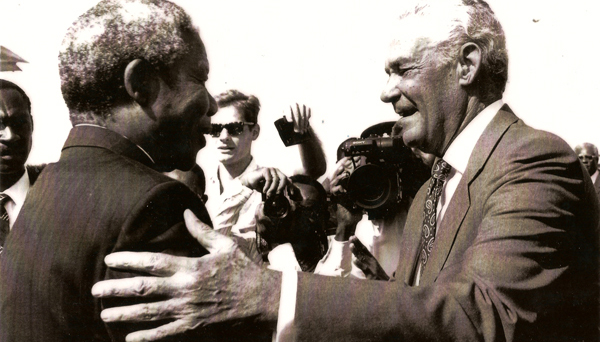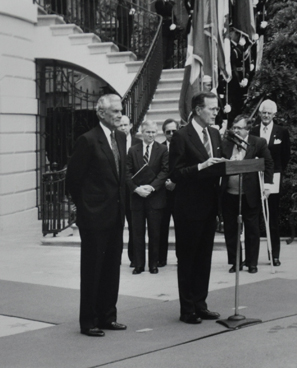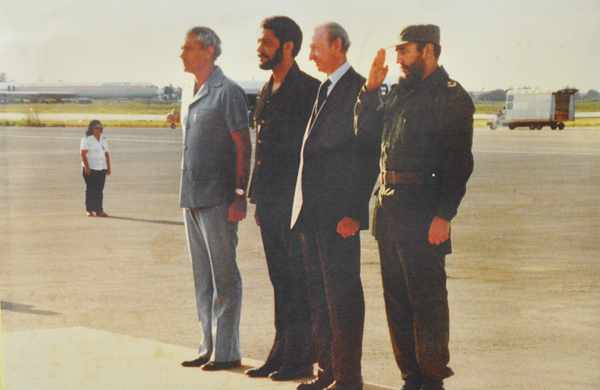World Statesman

With South African President Nelson Mandela
Michael Manley realised that the Jamaican society and economy could not be made significantly more prosperous, equitable and just without improvement in international political and economic structures that had a decisive impact on Jamaica and other developing countries. He set about identifying with other disadvantaged countries and became active in such bodies as the Non-Aligned Movement, the alliance of African, Caribbean and Pacific (ACP) countries, and the Group of 77 developing nations. The iconic President Julius Nyerere of Tanzania called him “the leader of the trade union of the poor”.

With U.S. President George H.W. Bush
At the Conference of the Non-Aligned Movement in Algiers in September 1973, Manley repeated a truism that Che Guevara brought to attention at a Food & Agriculture Organisation (FAO) conference in Rome in 1964 – that the terms of trade were hopelessly skewed against primary-producing third world countries of the South and in favour of the industrialised countries of the North; that, for example, it required more and more sugar exports to finance the purchase of a single imported tractor. Manley often repeated this theme and called for a New International Economic Order (NIEO) in which, inter alia, prices of primary products and manufactured goods would be indexed against each other.
His was a highly respected voice, even among those who did not share his views. He was a Vice President and later honorary President (1992-97) of the Socialist International and also Chairman of its Committee on Economic Policy.
Ideology and bonds

L-R Michael Manley, Grendian Prime Minister Maurice Bishop, UN Secretary-General Kurt Waldheim and Cuban President Fidel Castro
Manley developed a close bond with the social democrats of northern Europe – especially Swedish Prime Minister Olof Palme and Norwegian Prime Minister Odvar Nordli – whose brand of socialism was in line with that of his People’s National Party (PNP). He had no difficulty, however, finding common cause with more radical socialists like Fidel Castro, whose intellect, humanity and principled activism he admired. Manley and Castro shared the view that justice must be universal, whether in terms of domestic or international economic relations or the power equations between races.
When in December 1975 United States Secretary of the State Henry Kissinger warned Manley not to support Cuba’s presence in Angola to defend that country against apartheid South Africa’s incursion, Manley declined to commit Jamaica to opposing Cuba’s defence of Angola or to neutrality, despite hints that non-compliance would jeopardise urgently needed financial aid. Jamaica, in concert with all of Africa, voted at the United Nations in favour of the Cuban presence in Angola and the proposed US financial assistance did not materialise. The number of operatives of the US Central Intelligence Agency (CIA) in Kingston was promptly doubled.
At the international level, through his adherence to cardinal principles and rational arguments and the power of his oratory, Michael Manley summoned the conscience of the world to the causes he held dear. His stature as an outstanding world statesman was such that he played pivotal roles in a number of important international initiatives by which relatively powerless nations, working cooperatively, achieved significant gains. Those initiatives include the Gleneagles Agreement against apartheid in sports and consequent United Nations International Convention Against Apartheid in Sports; the resolution of the Southern Rhodesia impasse and creation of the independent state of Zimbabwe; renegotiation of the Panama Canal Treaty between Panama and the United States; the establishment of the International Bauxite Association; and the adoption of the Law of the Sea Convention and location of the International Seabed Authority in Kingston. Significantly, the groundwork underlying the establishment of the International Bauxite Association protected Jamaica from any possible fallout from the introduction of the very significant bauxite production levy by the Manley Government to secure a more equitable share of the proceeds of the exploitation of a depleting Jamaican resource.
Mr Manley’s performance as a regionalist has paid dividends in such areas as the strengthening of the Caribbean Community (CARICOM), various technical exchanges with Cuba, and the economic benefits of the San Jose Accord, followed by the Petro Caribe Agreement. Jamaica’s high profile under his watch earned the nation lasting goodwill and a number of beneficial agreements with countries outside the region.
Reflection of stature
His international stature is reflected in a number of prestigious awards, such as the United Nations gold medal for his contribution to the anti-apartheid struggle; a Socialist International citation for his advocacy of the New International Economic Order and the deepening of democracy in Jamaica and the Caribbean; the World Peace Council’s Juliot Curie Peace Award; the Order of the Caribbean Community; the South African Order of Supreme Companion of O.R. Tambo for his outstanding role in the international campaign against apartheid; induction into the International Civil Rights Walk of Fame at the Martin Luther King Junior National Historic Site in Georgia, USA; and numerous honours from foreign states and institutions.
His world view on economics, which he held in common with other visionary third-world leaders like President Nyerere, did not prevail during his life, but it is noteworthy that in terms of international economic relations the developed countries that resisted his demand for a new international economic order four decades ago are now increasingly adopting Manley prescriptions and embodying them in such programmes as the United Nations Millennium Development Goals.
Manley’s call for an NIEO was tempered by his belief in self-reliance. He became an apostle of South-South cooperation, citing as an example the possibilities of establishing aluminium smelters and extrusion industries by marrying Jamaican bauxite with the energy derived from oil or natural gas produced by another “third world” nation.
His impact on the world was reflected in the Michael Manley Foundation’s Michael Manley Lecture on December 10, 2004, the 80th anniversary of his birth, when his daughter Rachel Manley, addressing “The Quest for a Caribbean Voice”, attested: “I believe that the most important single gift of my father’s legacy to Jamaica was giving voice to the articulation of a vision. He understood that a nation cannot find its way unless it seizes that voice. And seize it he did…Voice is the means by which he articulated our needs and wants and demands and challenges. It was the confidence he gave to that voice as an internationalist that made our tiny nation speak to the world, and made the world listen”.
